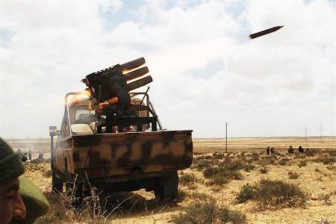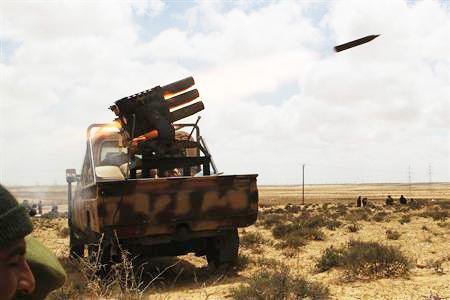TRIPOLI (Reuters) – Rebels cheered the defection of a Libyan minister as a sign that Muammar Gaddafi’s rule was crumbling, but US officials warned he was far from beaten and made clear they feared entanglement in another painful war.

After former Libyan foreign minister Moussa Koussa arrived in Britain, London urged others around Gaddafi to follow suit. “Gaddafi must be asking himself who will be the next to abandon him,” Foreign Secretary William Hague said.
Soon afterwards Ali Abdussalam Treki declined to take up his appointment by Gaddafi as UN ambassador, condemning the “spilling of blood” in Libya.
But reports of defections of more senior Gaddafi aides remained unconfirmed.
Asked about an Al Jazeera TV report that he was one of several who had fled to Tunisia, top oil official Shokri Ghanem told Reuters by phone late yesterday: “This is not true, I am in my office and I will be on TV in a few minutes.” Koussa’s defection however raised the spirits of rebel fighters who were put to headlong retreat in a counter-attack by Gaddafi forces this week.
“We are beginning to see the Gaddafi regime crumble,” rebel spokesman Mustafa Gheriani said in the eastern town of Benghazi.
Despite almost two weeks of Western air strikes, Gaddafi’s troops have used superior arms and tactics to push back rebels trying to edge westward along the coast from their eastern stronghold of Benghazi toward the capital Tripoli.
News that US President Barack Obama had authorised covert operations in Libya raised the prospect of wider support for the rebels.
Obama’s order is likely to alarm countries already concerned that air strikes on infrastructure and troops by the United States, Britain and France go beyond a UN resolution with the stated aim only of protecting civilians.
“I can’t speak to any CIA activities but I will tell you that the president has been quite clear that in terms of the United States military there will be no boots on the ground,” US Defense Secretary Robert Gates said.
“I am preoccupied with avoiding mission creep and avoiding having an open-ended, very large-scale American commitment,” he later told the Senate Armed Services Committee. “We know about Afghanistan; we know about Iraq.”
The top US military officer said Gaddafi’s forces were not close to collapse. “We have actually fairly seriously degraded his military capabilities,” Admiral Mike Mullen said. “That does not mean he’s about to break from a military standpoint.”
The top Vatican official in the Libyan capital cited witnesses yestesday saying at least 40 civilians had been killed in Western air strikes on Tripoli.
NATO said it was investigating but had no confirmation of the report. Libya’s state news agency, citing military sources, said Western air strikes had hit a civilian area in the capital overnight, but did not mention casualties.
Britain said it was focusing air strikes around Misrata, which has been under siege from government forces for weeks. Rebels say snipers and tank fire have killed dozens of people.
About 1,000 people are believed to have been killed in clashes between supporters and opponents of Gaddafi since the uprising against his 41-year-old rule began on Feb. 17, the British government said.
The rag-tag forces fighting Gaddafi say they desperately need more arms and ammunition to supplement supplies grabbed from government depots. The United States, France and Britain have raised the possibility, but say no decision has been taken.
NATO, which took over formal command of the air campaign on Thursday, said it would enforce a UN arms embargo on all sides. “We are there to protect the Libyan people, not to arm the people,” NATO chief Anders Fogh Rasmussen said in Stockholm.
Rebels were wary of any attempt by Koussa to negotiate immunity, saying Gaddafi and his entourage must be held accountable. “We want to see them brought to justice,” senior rebel national council official Abdel Hameed Ghoga told Reuters.
While British officials hope Koussa will provide military and diplomatic intelligence, Scottish officials and campaigners want him to shed light on the 1988 Pan Am airliner bombing over Lockerbie in Scotland, which killed 259 people, mostly Americans, on the plane and 11 on the ground. A Libyan citizen was convicted over the bombing.
Noman Benotman, a senior analyst at a British think tank, said his friend Koussa was “very positive to cooperate not just with the UK government, but Europe as well”.

